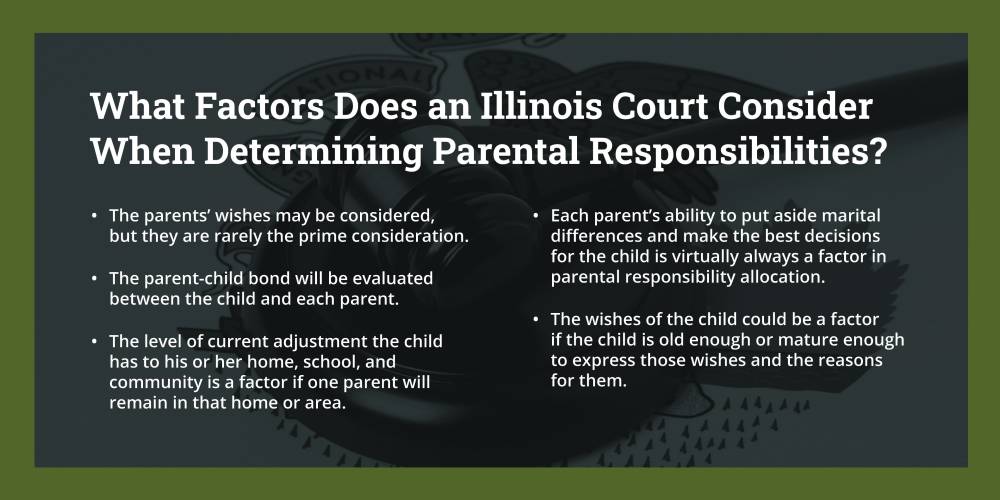630-462-9500
After Hour New Client Telephone Number 630-690-6077
1776 S. Naperville Road, Building B, Suite 202,
Wheaton, IL 60189
What Are the Child’s "Best Interests?"
 Parents who have gone through a divorce have likely heard the phrase "in the child’s best interests." Across the nation, every family court in every state makes custody decisions (the allocation of parental responsibilities in Illinois) based on the child’s best interests. But what does that actually mean? Is breaking up a family through divorce actually in the child’s best interests?
Parents who have gone through a divorce have likely heard the phrase "in the child’s best interests." Across the nation, every family court in every state makes custody decisions (the allocation of parental responsibilities in Illinois) based on the child’s best interests. But what does that actually mean? Is breaking up a family through divorce actually in the child’s best interests?
The answer to that question depends on a number of factors, not the least of which is whether parents who are unhappy in their marriage are the best parents they can be. Deciding to divorce is rarely an easy decision or one that is made on the spur of the moment without considering how it will affect the children.
That said, your decisions regarding your child’s best interests could be significantly different from what the court has in mind. If you are considering divorce and want an attorney who will take your wishes into consideration while also understanding how the court views your child’s best interests, it is time to speak to an experienced Wheaton, IL family law attorney.
Defining the Best Interests of the Child Can Be Elusive
According to the U.S. Government Child Welfare Information Gateway, there is no standard definition of the best interests of the child. "Best interests" are far from objective and measurable; rather, they are usually determined by factors related to the specific circumstances of the parents and child. Of course, the child’s ultimate safety and well-being are overriding determinants, making a history of domestic violence committed by a parent a fairly universal measurement of the child’s best interests.
Other determining factors are much more abstract, not to mention subjective. For example, when a judge who has never met the parents or the child makes a decision based on the "emotional ties and relationship between the child and parent," that decision is likely to be fairly subjective. State Bar Associations argue that judges must have broad discretion when making determinations relative to a child’s best interests precisely because of the abstract, personalized nature of family law cases.
If a mother and father are divorcing, and both want more parenting time, how does the judge determine how that translates into the child’s best interests? The suggestion for judges is to keep the child in his or her home when possible. Does this mean that the parent who will continue to live in the actual physical house the family lived in during the marriage should have more parenting time? Does "home" relate to the school, friends, and extended family members that live in close proximity to the house where the child lives? What if both parents move into new homes?
More and more, family court judges are making the determination that it is in the child’s best interests for both parents to be equally involved with the children, which is generally a good thing, except when it is not. If there is strong evidence that a child could suffer physical or emotional harm through a continuing relationship with one parent, then that must be a consideration. However, there must be clear and convincing evidence of this theoretical harm because an allegation of this sort can keep a totally innocent parent from seeing his or her child for months and months while the judicial system trudges on.
What Factors Does an Illinois Court Consider When Determining Parental Responsibilities?
Family courts in Illinois will look at a number of factors when determining the allocation of parental responsibilities and parenting time. A child’s best interests may be decided based on the following:
- The parents’ wishes may be considered, but they are rarely the prime consideration.
- The ability of each parent to provide for the child’s emotional and physical needs will be examined, including financial resources, mental health, and physical health, and whether the parent is willing to foster a positive relationship with the other parent.
- The parent-child bond will be evaluated between the child and each parent.
- The past level of involvement of each parent in childcare, including physically caring for the child, assisting with homework, involvement in school and after-school activities, attending medical appointments, and providing instruction and discipline.
- The physical distance between the parents, the child’s daily schedule, the parents’ ability to cooperate, and the cost of transporting the child are factors in determining the child's best interests.
- The level of current adjustment the child has to his or her home, school, and community is a factor if one parent will remain in that home or area.
- Each parent’s ability to put aside marital differences and make the best decisions for the child is virtually always a factor in parental responsibility allocation. Any history of child neglect or child abuse will impact Illinois' decisions regarding parenting time and parental responsibilities.
- The wishes of the child could be a factor if the child is old enough or mature enough to express those wishes and the reasons for them.

How to Ensure Your Child’s Best Interests Are Being Protected During Divorce
Divorce can be both legally complex and emotionally challenging. Your goal as a parent should be to protect your child from the grown-up aspects of the divorce while acknowledging the effect divorce has on the child. Some tactics to remember during your divorce include:
- Minimize your child’s exposure to the conflict between you and your spouse.
- Do not discuss grown-up reasons for your divorce with your child; i.e., you do not need to tell your child that "Daddy cheated."
- Never speak negatively about the other parent to or in front of the child.
- Never use your child as a pawn in your divorce.
- Seek professional counseling for your child to ensure he or she is handling feelings and emotions appropriately.
Contact a DuPage County, IL Family Lawyer
If you are facing a case to determine the allocation of parental responsibilities and parenting time, it is important that you speak to a knowledgeable Wheaton, IL parental responsibilities attorney from The Stogsdill Law Firm, P.C.. Our firm is one of the most prestigious in the area.
Because we are a large firm, our clients have access to significant resources, yet we are highly client-centered, which is usually a benefit of a smaller firm. You will benefit from our extensive experience in every aspect of family law. Call 630-462-9500 to schedule your initial attorney consultation.




















